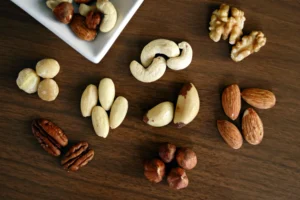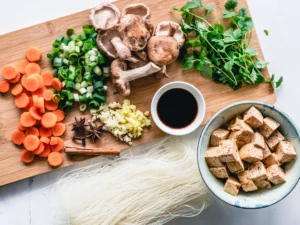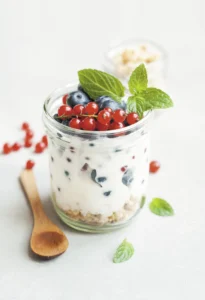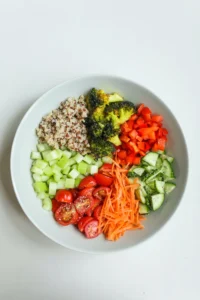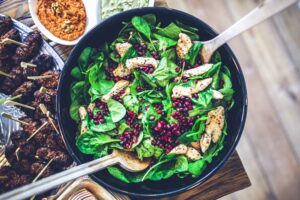Generated by Contentify AI
- Introduction
- Nutrition and Aging
- The Impact of Diet on Longevity
- Essential Nutrients for Healthy Aging
- Anti-aging Foods and Superfoods
- Healthy Habits for Longevity
- Food Preparation Tips for Aging Individuals
- The Role of Supplements in Longevity
- Managing Weight and Metabolism as You Age
- Conclusion

Introduction
As we age, our dietary needs change. Eating a nutritious diet is essential for maintaining good health, reducing the risk of chronic diseases, and preserving our independence as we age. But just what constitutes a healthy diet for older adults? In this blog post, we’ll explore the basics of nutrition and aging, looking at how to make the most of our food choices for optimal health and longevity.
First, let’s look at the basics of healthy eating. Eating a balanced diet that includes the right mix of fruits, vegetables, whole grains, and lean proteins can help us keep our energy levels up, maintain a healthy body weight, and reduce the risk of chronic diseases like heart disease, stroke, diabetes, and certain cancers.
In addition to the basics of healthy eating, older adults need to pay special attention to certain vitamins and minerals. Vitamin B12, calcium, and vitamin D are important for keeping bones strong and preventing osteoporosis. Vitamin C and B6 help protect us against infection, while iron helps us maintain healthy red blood cells. Supplementing with omega-3 fatty acids and taking a multivitamin may also help us stay healthy as we age.
It’s also important to watch our portion sizes. Even healthy food choices can be unhealthy in large amounts. Eating smaller portions and limiting the amount of fat, sugar, and sodium in your diet can help you maintain a healthy weight and reduce your risk of developing chronic diseases.
In addition to healthy eating, staying active is an important part of staying healthy as we age. Exercise helps reduce the risk of falls, improves balance and coordination, and helps us manage chronic conditions. Being physically active can also reduce the risk of depression and anxiety.
Finally, it’s important to stay hydrated. Drinking plenty of water throughout the day can help us stay healthy by keeping our bodies properly hydrated. For most people, eight 8-ounce glasses a day is the optimal amount of water for good health.
Nutrition and aging go hand in hand — eating the right foods and getting enough physical activity can help us stay healthy and independent well into our golden years. By making informed decisions about our food choices and staying active, we can maximize our longevity and enjoy life to the fullest.
Nutrition and Aging
As we grow older, it’s important to make sure that we’re eating the right foods to help support our health and wellbeing. Nutrition and aging are closely linked, because the foods we eat can support us in living longer, healthier lives.
In the Nutrition and Aging section of Nutrition and Aging: Eating for Longevity, we’ll explore what and how much we should be eating to get the most out of our diets. We’ll look at the various nutrients that are important to our health and how we can get more of them from the food we eat. We’ll also discuss ways to make sure that we’re eating the right foods, ways to properly balance our meals, and how to make healthy choices even when we’re eating out.
We’ll also take a look at how to stay physically active as we age, as well as the importance of avoiding obesity and other health risks. We’ll share tips on how to make sure that we’re maintaining a healthy lifestyle, even as our bodies age.
By learning more about nutrition and aging, and by making sure that we’re eating the right foods and making healthy choices, we can help ensure that we have a longer, healthier life. Nutrition and Aging: Eating for Longevity will provide the information you need to make sure that you’re getting the most out of your diet and your life.
The Impact of Diet on Longevity
The importance of diet in relation to longevity cannot be overstated. Eating habits have a significant impact on both short- and long-term health. Not only can poor dietary choices increase the risk of developing chronic conditions, but they can also shorten lifespan.
Recent studies have shown that diets rich in antioxidants, micronutrients, and omega-3 fatty acids can help promote healthy aging and reduce the risk of age-related diseases such as cardiovascular disease, stroke, and some forms of cancer. For example, diets that include a variety of fruits and vegetables, whole grains, and lean proteins can help to provide the body with important vitamins, minerals, and other essential elements. Eating a nutrient-dense, balanced diet is also associated with better cognitive health, improved energy levels, and a reduced risk of depression.
It is also important to consider the amount of calories consumed when trying to promote longevity. Eating too much or too little can both have a negative impact on health. Consuming too few calories can lead to deficiencies in essential nutrients and reduce the body’s natural defenses against disease. Consuming too many calories can lead to weight gain, which increases the risk of developing heart disease, stroke, and type 2 diabetes.
In addition to the type and amount of food consumed, lifestyle factors such as exercise and stress management play important roles in promoting longevity. Regular physical activity helps to maintain healthy body weight, reduce the risk of developing chronic diseases, and support overall health. Stress management techniques such as yoga and mindfulness can help to protect against the negative effects of stress on the body and mind.
By understanding the impact of diet on longevity and making informed decisions about what to eat, it is possible to take steps towards a healthier, longer life. Eating a nutrient-dense, balanced diet in moderation, coupled with physical activity and stress management techniques, can help to promote a healthier, longer life.
Essential Nutrients for Healthy Aging
When it comes to healthy aging, a balanced diet is key. Eating the right foods can make all the difference in how we age, with some essential nutrients playing an important role. In this blog section, we’ll take a closer look at some of the most important vitamins, minerals, and other nutrients that are important for keeping us healthy and fit as we age.
Starting with vitamins, Vitamin C is known for its antioxidant properties, which can help protect our cells from damage. It also helps with collagen production, which is important for maintaining healthy skin, bones, and joints. Vitamin A is essential for vision, as well as healthy skin and mucous membranes. Older adults can get vitamin A from a variety of sources such as carrots, sweet potatoes, and dark leafy greens.
Vitamin D is also important for maintaining bone health, as well as helping the body absorb calcium. It can be found in fatty fish, egg yolks, and fortified dairy products. Older adults should also make sure to get enough B vitamins, as these help with energy production and keeping the nervous system healthy.
Minerals are also essential for healthy aging. Calcium is important for maintaining strong bones, while magnesium helps with muscle and nerve function. Iron is essential for oxygen transport, and zinc is important for wound healing and the immune system. Older adults should also make sure to get enough potassium, which helps with fluid balance and blood pressure.
Finally, there are other important nutrients that are essential for healthy aging. Omega-3 fatty acids are important for heart health, while probiotics can help promote digestive health. Antioxidants, such as those found in fruits and vegetables, can help protect the body from the effects of aging. Protein is also important for maintaining muscle mass and strength, and fiber can help keep the digestive system running smoothly.
By following a diet that includes all of these essential nutrients, older adults can make sure they stay healthy and fit as they age. Eating a variety of nutrient-rich foods can help ensure that the body gets all the nutrients it needs to stay healthy and keep aging at bay.
Anti-aging Foods and Superfoods
As we age, nutrition plays an increasingly important role in maintaining health and vitality. While the aging process is natural and inevitable, with the right nutrition plan, we can slow the effects of aging and improve quality of life for years to come. The Anti-Aging Foods and Superfoods section of Nutrition and Aging: Eating for Longevity looks closely at the best foods to incorporate into your diet for maximum anti-aging benefits.
The importance of consuming a nutrient-dense diet cannot be overstated. Through carefully selected whole foods, you can provide your body with the essential vitamins, minerals, and micronutrients it needs to stay healthy and strong. Superfoods, in particular, are nutrient powerhouses that can help boost your brain power, slow down signs of aging, and protect against age-related diseases.
The Anti-Aging Foods and Superfoods section of Nutrition and Aging: Eating for Longevity will teach you which superfoods to include in your diet. For example, you’ll learn why blueberries, avocados, and salmon should be regular additions to your meals. You’ll also find out about the latest research on the anti-aging benefits of specific vitamins, minerals, and other nutrients, and how to best incorporate them into your daily diet.
Finally, you’ll learn how to prepare anti-aging foods in delicious and nutritious recipes. From soups and salads to smoothies and snacks, you’ll find all the inspiration and guidance you need to create delicious, nutrient-packed meals your whole family will love.
Give yourself the gift of healthy, youthful longevity with the Anti-Aging Foods and Superfoods section of Nutrition and Aging: Eating for Longevity!
Healthy Habits for Longevity
The adage “you are what you eat” has been around for centuries, and it’s as true now as it ever was. When it comes to aging gracefully and staying healthy, nutrition is one of the most important aspects of a person’s life. Eating a balanced diet with healthy foods can have a positive impact on your overall health and well-being. A dietary approach to aging that focuses on healthy habits may help you live a longer, healthier life.
In the world of nutrition, there are five key elements that can be used to create a healthful diet for aging:
1. Eat plenty of fruits and vegetables. Fruits and vegetables are full of vitamins, minerals, and fiber, and can help you get the nutrition you need for healthy aging. Try to choose a variety of different types of fruits and veggies in a variety of colors to get the most benefit.
2. Choose lean proteins. Lean proteins, such as fish, poultry, beans, and legumes, are important for keeping your muscles strong and providing energy for your cells. These proteins can also keep you feeling fuller for longer.
3. Eat healthy fats. Healthy fats like olive oil, nuts, and avocados provide essential fatty acids that your body needs for energy, brain function, and cell repair.
4. Choose whole grains. Whole grains are packed with antioxidants and fiber, which can help keep your digestion regular and your heart healthy.
5. Limit processed foods. Processed foods are often high in calories, sugar, and unhealthy fats, and can be difficult for your body to break down. Limiting these types of foods can help you stay healthy as you age.
When it comes to aging gracefully, healthy eating is essential. With a well-rounded diet and these five key elements, you can help give your body the nutrition it needs to stay healthy and strong for years to come.
Food Preparation Tips for Aging Individuals
As we age, our bodies can become less capable of digesting certain foods, which can make food preparation more difficult. Fortunately, there are many tips and tricks to help aging individuals make the most of their meals.
First and foremost, it’s important to remember to eat a balanced diet. Eating plenty of fruits and vegetables, lean proteins, and healthy fats can help promote overall health and longevity. Additionally, aging individuals may need to adjust their portion sizes or switch to more nutrient-dense foods.
It’s also important to consider the physical limitations of aging individuals. For instance, many seniors may have difficulty standing for long periods of time. If this is the case, look for recipes that require shorter cooking times or that can be cooked in a slow cooker.
Finally, it can be beneficial for aging individuals to focus on convenience. Look for recipes that require minimal ingredients or that can be pre-prepped and stored for later use. Time-saving kitchen gadgets like programmable slow cookers and air fryers can also be helpful.
All in all, there are many strategies that aging individuals can employ to make food preparation a little easier. Eating a balanced, nutrient-dense diet, being mindful of physical limitations, and utilizing convenient kitchen gadgets are all good places to start. With a bit of extra effort, aging individuals can enjoy meals that are both delicious and healthy for years to come.
The Role of Supplements in Longevity
When it comes to living a long and healthy life, nutrition is key. Aging is a natural process that affects everyone, and the best way to make sure you’re living a long and healthy life is to pay attention to what you’re putting in your body. While a balanced diet of healthy foods is essential, supplements can also play an important role in supporting longevity.
Supplements, when used correctly, can provide additional vitamins and minerals that may not be available in the foods you eat. Certain supplements may also help reduce the risk of conditions associated with aging, such as arthritis, high blood pressure, and diabetes. Research has also shown that certain supplements may help boost your immune system and reduce inflammation, both of which are important components to healthy aging.
In addition to providing important nutrients, supplements can also help you create a healthier lifestyle by simplifying your daily routine. For instance, taking a multivitamin can make it easy to get all of the nutrition you need in one convenient capsule. Supplements can also help ensure that you’re getting the right amounts of certain vitamins and minerals, which can be difficult to do with food alone.
When choosing supplements, it’s important to consult with a healthcare professional to make sure they’re right for you. A doctor or nutritionist can help you determine the best supplements to take for your age, lifestyle, and health concerns. It’s also important to read the labels carefully and make sure the ingredients are natural and organic.
By incorporating supplements into your healthy lifestyle, you can help ensure that you’re getting all the vitamins and minerals you need to stay healthy and support longevity. They can also help make it easier to maintain a balanced diet of healthy foods, which is the key to living a long and healthy life.
Managing Weight and Metabolism as You Age
As we age, our bodies naturally slow down, and one area that becomes increasingly important to manage is our weight and metabolism. As we grow older, our bodies tend to become less efficient at burning calories and our metabolisms slow down, meaning it’s easier to pack on the pounds and harder to lose them.
The good news is that there are a few steps you can take to help keep your metabolism revved up and your weight in check, both of which are essential for longevity.
The first step is to watch your diet. Eating a balanced diet with lots of fruits, vegetables, and lean proteins is the best way to keep your metabolism running and your weight in check. Avoid sugar and processed foods, and focus on eating whole, natural foods.
In addition to eating a balanced diet, you should also focus on increasing physical activity as you age. Exercise not only boosts your metabolism, it also helps keep your muscles strong and your joints flexible. Aim to incorporate aerobic activities like walking, swimming, and biking, as well as strength training exercises like lifting weights, to build muscle and burn fat.
Finally, make sure to get enough sleep. Quality sleep is essential for keeping your metabolism running at its peak. Aim to get 7-9 hours of sleep each night and try to go to bed and wake up at the same time each day.
By following these tips, you can better manage your weight and metabolism as you age, helping to ensure a healthier, longer life.
Conclusion
As we age, proper nutrition plays an increasingly important role in our overall health and longevity. Eating the right types of food and maintaining a healthy diet is essential for helping us to look and feel our best. Eating the right foods can also help to protect us from age-related diseases, such as heart disease, stroke, and diabetes.
Nutrition is key in aging healthfully and maintaining a good quality of life. Eating a balanced diet with plenty of fresh fruits and vegetables, lean proteins, whole grains, healthy fats, and low-fat dairy products is essential, and the Mediterranean diet is a great option for seniors looking for an easy-to-follow eating plan. Additionally, vitamins and supplements can help to fill in any nutritional gaps in our diet and can help to protect us from age-related health conditions.
Finally, it’s essential that seniors stay active and exercise regularly, as physical activity can help to reduce the risk of age-related health issues and diseases, and can even help to improve cognition.
In conclusion, eating a balanced diet and exercising regularly are essential for seniors to stay healthy and to age healthfully. Eating the right types of food, maintaining a healthy diet, and staying active can all help to reduce the risk of age-related health issues and diseases, and can even help to improve cognition and quality of life. Nutrition and physical activity are key to staying healthy and happy as we age.

